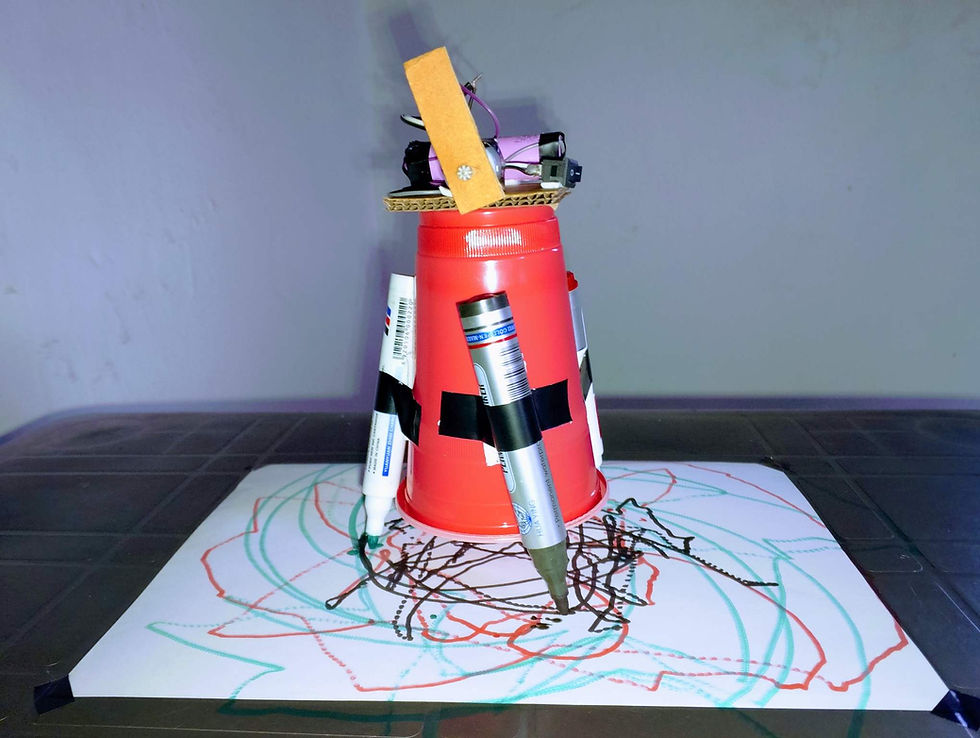How to make a blinking pumpkin head with an arduino board for Halloween for your kids
- Mike Makers
- Oct 15, 2018
- 3 min read

Hi there,
Welcome back for a new tutorial.
Make a Arduino project
Halloween is on it's way and will be among us soon. So as we "Makersgeneration" like to make STEM projects for you and for your kids, we prepared a nice project for you and your kids with a pumpkin and an arduino uno board.
The project is to make a blinking pumpkin head with an arduino uno board inside the pumpkin.

Electronics components
To start this project, you need to gather the following electronics components:
1 arduino uno board
Diodes
Wires
1 prototyping board
One 9V battery (optionnal)
resistors
Once you have all the electronic components, you may also need:
A knife
A spoon
Those are necessary to cut the pumpkin and remove the pumpkin's seed. Once done, we may say you are half ready for halloween 2018. :-)))
Don't forget to help your kids cut the pumpkin if you are doing it with them.
Arduino Haloween pumpkin schematic
You can now wire the eletronics components with the arduino uno board. You can follow the following schematic to assemble your electronics parts.

Programming section
Now that all your components are together, upload the following program to your arduino board and and it should blink like a christmas tree. Lol.
A small video of the project is available at the end of the video.
// Pin 13 has an LED connected on most Arduino boards. // give it a name: int led6 = 12; int led5 = 11; int led4 = 10; int led3 = 9; int led2 = 8; int led1 = 7; // the setup routine runs once when you press reset: void setup() { // initialize the digital pin as an output. pinMode(led6, OUTPUT); pinMode(led5, OUTPUT); pinMode(led4, OUTPUT); pinMode(led3, OUTPUT); pinMode(led2, OUTPUT); pinMode(led1, OUTPUT); } // the loop routine runs over and over again forever: void loop() {
for( int a=1 ;a<10;a++) { digitalWrite(led1, HIGH); // turn the LED on (HIGH is the voltage level) digitalWrite(led2, HIGH); // turn the LED off by making the voltage LOW delay(100); // wait for a second digitalWrite(led1, LOW); // turn the LED on (HIGH is the voltage level) digitalWrite(led2, LOW); delay(100);// wait for a second }
for(int b=1 ;b<10;b++) {
digitalWrite(led3, HIGH); // turn the LED on (HIGH is the voltage level) digitalWrite(led4, HIGH); // turn the LED off by making the voltage LOW delay(100); // wait for a second digitalWrite(led3, LOW); // turn the LED on (HIGH is the voltage level) digitalWrite(led4, LOW); delay(100);// wait for a second } for(int c=1 ;c<10;c++) {
digitalWrite(led5, HIGH); // turn the LED on (HIGH is the voltage level) digitalWrite(led6, HIGH); // turn the LED off by making the voltage LOW delay(100); // wait for a second digitalWrite(led5, LOW); // turn the LED on (HIGH is the voltage level) digitalWrite(led6, LOW); delay(100);// wait for a second }
}
Future of this project
You can of course improve the project to make it blink faster, add more diodes, add sound and even more. Don't forget to leave a comment and share your project if you decide to make it.
Social medias
Our social medias ( Facebook, Twitter, Google+, Instagram and Youtube) are also a good platform to stay tuned to our last projects and leave a comment for all of you. More are also shared like STEM events in Washington DC, Maryland and Virginia with our newsletter, tutorials, discounts, after-schools and camps for kids. Please subscribe at the bottom of our website (www.makersgeneration.net).
STEM after-school and camps in Washington DC and Maryland
We do organise STEM after-school and workshop for kids this fall and this winter in Washington DC and Silver Spring Maryland. All this on Robotics, coding, 3D printing, Artificial Intelligence, 3d modeling and more. You can find more details on the program with the follwoing links:
Hope you enjoyed the tutorial. See you soon for a new STEM tutorial




























Comments